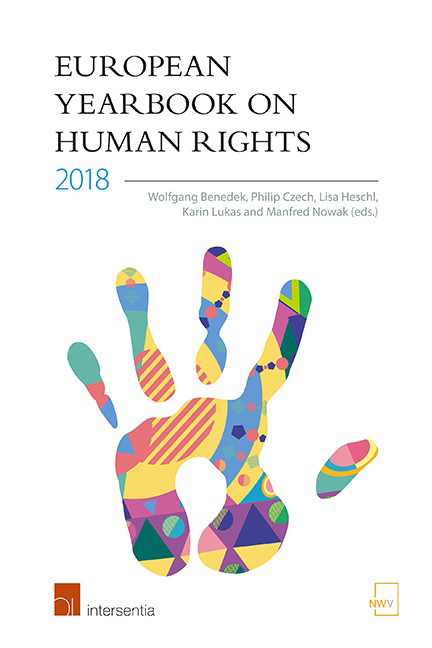Book contents
- Frontmatter
- Scientific Advisory Board
- Editors’ Preface
- Contents
- List of Abbreviations
- List of Contributors
- Part I Topic Of The Year
- Part II Eu
- Part III Coe
- The Jurisprudence of the European Court of Human Rights in 2017
- A Decade of Violations of the European Convention on Human Rights: Exploring Patterns of Repetitive Violations
- The Boundaries to Dialogue with the European Court of Human Rights
- Unprincipled Disobedience to International Decisions: A Primer from the Russian Constitutional Court
- The Impact of ECtHR and CJEU Judgments on the Rights of Asylum Seekers in the European Union: Adversaries or Allies in Asylum?
- The Human Right to Leave Any Country: A Right to be Delivered
- Some Reflections on the Principle of the Best Interests of the Child in European Expulsion Case Law
- Salafism in Europe: A Legal and Political Analysis of Human Rights and Security
- Delays in the Implementation of ECtHR Judgments: The Example of Cases Concerning Electoral Issues
- PART IV OSCE
- Part V Others
- Part VI Book Reviews
- Index
The Boundaries to Dialogue with the European Court of Human Rights
from Part III - Coe
Published online by Cambridge University Press: 31 January 2019
- Frontmatter
- Scientific Advisory Board
- Editors’ Preface
- Contents
- List of Abbreviations
- List of Contributors
- Part I Topic Of The Year
- Part II Eu
- Part III Coe
- The Jurisprudence of the European Court of Human Rights in 2017
- A Decade of Violations of the European Convention on Human Rights: Exploring Patterns of Repetitive Violations
- The Boundaries to Dialogue with the European Court of Human Rights
- Unprincipled Disobedience to International Decisions: A Primer from the Russian Constitutional Court
- The Impact of ECtHR and CJEU Judgments on the Rights of Asylum Seekers in the European Union: Adversaries or Allies in Asylum?
- The Human Right to Leave Any Country: A Right to be Delivered
- Some Reflections on the Principle of the Best Interests of the Child in European Expulsion Case Law
- Salafism in Europe: A Legal and Political Analysis of Human Rights and Security
- Delays in the Implementation of ECtHR Judgments: The Example of Cases Concerning Electoral Issues
- PART IV OSCE
- Part V Others
- Part VI Book Reviews
- Index
Summary
ABSTRACT
This article aims to answer the question which legal boundaries are applicable when domestic courts engage in a dialogue with the European Court of Human Rights (ECtHR) about a Strasbourg judgment. This question is answered from an international legal perspective, i.e. the perspective of the ECtHR, and the perspective of eleven domestic legal orders. Where possible, this article will comment on the practical significance of the legal boundaries found, so as to put their significance into perspective.
INTRODUCTION
The States Parties to the European Convention on Human Rights (ECHR) have invited the European Court of Human Rights (ECtHR) to ‘ deepen ‘ its dialogue with the highest national courts ‘ further ‘. For the ECtHR, dialogue is a ‘ high priority ‘ as well. Dialogue has been on the agenda of the ECtHR and the States for some years and, therefore, has turned out to be more than just a fashionable buzzword; it is here to stay. The States Parties have even drafted a ‘ Protocol of Dialogue ‘ to the ECHR. This optional protocol will enable the highest domestic judges to request the ECtHR to give an advisory opinion on questions of principle relating to the ECHR. The requesting court should present, inter alia, a‘statement of its own views on the question ‘ and decide itself ‘ on the effects of the advisory opinion in the domestic proceedings ‘. The Protocol thus makes it possible for the domestic and European judges to respond to each other. The appeal of engaging in a dialogue with the ECtHR is clear: it facilitates that domestic judges can explain to the ECtHR how their legal system works and why they make certain choices within their specific domestic context. Dialogue can, thus, contribute to the smooth cooperation between the ECtHR and the domestic judges. Nevertheless, not every instance of dialogue has been equally eagerly applauded.
- Type
- Chapter
- Information
- European Yearbook on Human Rights 2018 , pp. 287 - 318Publisher: IntersentiaPrint publication year: 2018

